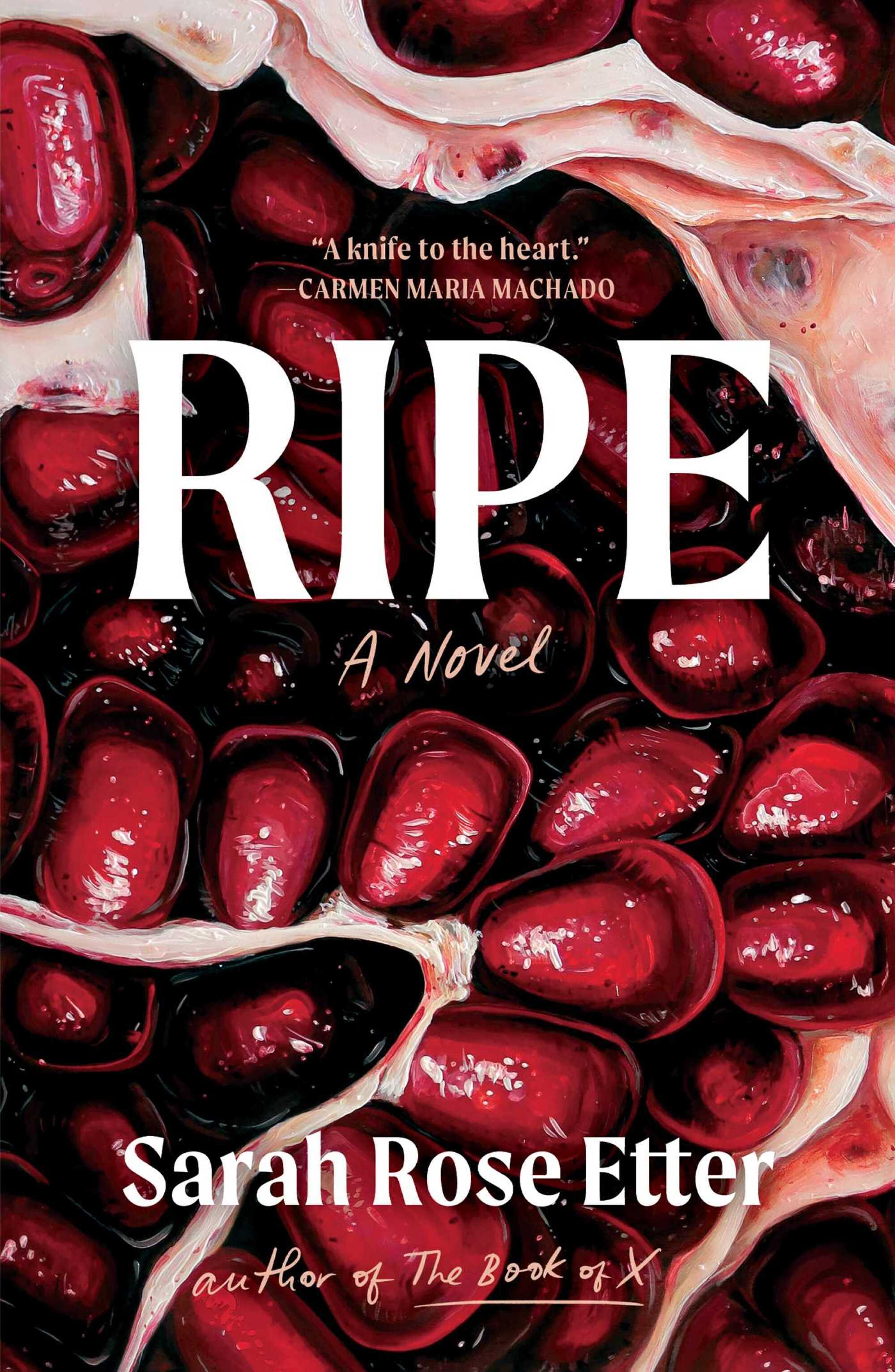
On the Shelf
'Ripe'
By Sarah Rose Etter
Scribner: 288 pages, $25
If you buy books linked on our site, The Times may earn a commission from Bookshop.org, whose fees support independent bookstores.
In 2005, Sarah Rose Etter was standing near the bar of a Maggiano’s outside Philadelphia in a white apron, learning to taste the difference between Merlot and Cabernet, when she got the call she’d been waiting for: a job offer to report on prisons in Boston. “I threw off my apron, and I said, ‘Bye! I’m going to be a writer!’” Thirteen years, several industries and two novels later, she is careful to add: “This is not to denigrate Maggiano’s or working as a waitress. Working as a waitress is hard work.”
Though Etter believes she was put on this Earth to be a writer, she has always been realistic about paying the bills. “It was hard for me to admit I was a writer,” she told me over the phone from her apartment in Los Angeles. “I didn’t grow up wealthy, and my parents were both very focused on making sure I would have a job.”
Born and raised in Norristown, Pa., Etter went on to earn a writing MFA — while working full time — only to wind up, in 2018, moving to San Francisco to become a content designer in Silicon Valley. To say that it wasn’t her dream job is both an understatement and beside the point, because what she was earning wasn’t just money; it was material.
Malcolm Harris, author and firebrand leftist critic, on returning to his roots in ‘Palo Alto: A History of California, Capitalism and the World.’
Etter’s second novel, “Ripe,” out this week, tells the story of Cassie, a young woman who works for a soulless tech startup and tries to ignore the suffering all around her in San Francisco.
“When I moved to S.F., I really felt like society was crumbling around me,” Etter recalled. A man who lives outside Cassie’s window is drawn directly from the author’s experience. “I could hear him suffering,” Etter recalled. “Who am I going to call for help, the police? We were tied together in this weird way.”
But this is where Cassie’s world diverges from her author’s: She is followed by her own personal black hole — an actual black hole that floats over her shoulder like an anime character’s emotion bubble.
Cassie is expected to give it her all, as dictated by the Silicon Valley cult: learn to code, think more like a man, listen to her boss complain about freezing her eggs in between complaints about Cassie’s work. On her way home, she sees a man set himself on fire, “a pigeon with no feet eating vomit,” “another woman blacked out on the street before sunrise beneath the tender wet trees, her feet bleeding red through her white cotton socks in the rain.” The accompanying black hole shrinks or grows in response.
Cassie’s only form of relief from her hellscape is to call home to her father, who, after a series of bad financial decisions, stocks shelves at a grocery store. “All the things that are the dad in this book are my dad,” Etter says. “He passed away right before lockdown, and he really wanted me to write this book.”
Etter’s earlier novel, “The Book of X,” won the 2019 Shirley Jackson Award for best novel. A horror story about a young woman (also named Cassie) who is born with her stomach twisted into a literal knot, the debut brought Etter acclaim and comparisons to not only Jackson but also Carmen Maria Machado, who provides the succinct jacket blurb for “Ripe”: “This book is a knife to the heart.”
‘Uncanny Valley’ by Anna Wiener is a biting, funny memoir from inside San Francisco’s start-up culture.
“Obviously, to have my name in the same sentence or near Jackson’s, I feel so lucky,” Etter said. Jackson came back into play as Etter was writing “Ripe.” “I reread the ending of ‘Hangsaman’ many, many times. It became the cornerstone for how this book ends. And I read [Sylvia Plath’s] ‘The Bell Jar’ for the beginning.” As we were talking about Plath’s influence, Etter’s dog started to bark in the background. The poodle mix, Etter told me, is named Sylvia.

The name Cassie, shared by both her protagonists, also feels like something of a namesake — or an alter ego. “Cassie is always running right alongside me,” Etter said. “She is a way for me to work out the world. Would Cassie be my friend? I’m not sure.” She laughed. “But she represents the parts of me that are vulnerable and overwhelmed.”
Etter’s friend, novelist Kristen Arnett, recalls that “the first time we met, it felt a little like encountering a friendly tornado; you feel swept up and held with her, like she’s spinning you around, getting to know every part of you before gently placing you back down on Earth. As a writer, she’s intense — very committed to craft ... and very hard on herself.”
Etter’s writing style is informed by her packed schedule. (She still works full time in tech, managing a team of content designers for a “very people-first company.”) In both her novels, there are stopgaps, sections that allow for anecdotes and definitions. In “Ripe,” the latter includes “friendship,” “black hole,” “mother” and “work.” The novel is also broken down into the sections of a pomegranate: “exocarp,” “mesocarp,” “membrane” and “seeds.”
“Part of this is form,” she explains. “‘Ripe’ is in short fragments because I could only write that much per day.” Also, “I’m in competition with Twitter and your phone going off, not with other writers. There’s a way the book is playing with the attention span of the reader.”
Ruth Madievsky, a clinical pharmacist, insists her debut on sisters living dangerously is ‘so fictional!’ But it also channels her immigrant family’s stories.
A piece in Esquire recently declared 2023 “The Year of the Slim Volume,” noting a trend born of necessity. But what of the big books that still draw major attention? I told Etter I wanted to read one such critical darling, Jon Fosse’s “Septology,” a seven-volume, 832-page novel written in one sentence, but I found it difficult to sustain the concentration required. A friend had told me: “Give it a hundred pages or so, then it really takes off.”
“A hundred pages!” Etter exclaimed. “Can you imagine me telling someone to give me a hundred pages?! … Maybe it’s a gendered thing. If I had the time, would I write 1,000 pages about a mountain? Maybe!” We’ve been laughing, but she grows quiet. “Was I taught this, though? To not take up space as a writer? I don’t have that much runway.”
San Francisco wasn’t giving her any runway at all, so in 2019, she moved to Austin, Texas. She liked it there, and would’ve made it home if not for the state’s politics. “After Roe was overturned — when we actually saw the doors being shuttered, that’s different,” she said. “I didn’t feel comfortable being in a place that was going to criminalize reproductive rights.” Los Angeles is new to Etter, but it seems like a good fit. She recently took some new author photos in Hollywood Forever Cemetery and visited Eve Babitz’s niche in the mausoleum.
“I’ve been very lucky,” Etter said. “I’ve had a soft landing here. But I have to acknowledge that I have a lot of women friends and trans friends and friends of color still back in Texas. They don’t have a choice. They can’t afford a move.”
Etter’s work is undoubtedly surreal, but then so is American life today. She knows how to channel its contradictions because she lives them. “Sarah is one of the most driven and disciplined authors I’ve had the pleasure of representing,” says Etter’s agent, Kent Wolf, noting that precious few writers can survive off their books. “She addresses these exacting demands of late-stage capitalism in ‘Ripe’ in a way that I would describe as both razor sharp and deeply empathetic. ... She refuses to allow you to look away.”
As a result, “Ripe” hits very close to home. In this sense, Etter has managed to accomplish her goal as a writer: “I want people to know, with Cassie’s story, that they are not alone.”
L.A.s 13 most essential works of speculative fiction, from Octavia Butler, Philip K. Dick, Aldous Huxley, Salvador Plascencia and many more.
Emily Polson, Etter’s editor on “Ripe,” saw this quality in the manuscript right away: “It felt like stumbling upon Eden’s forbidden fruit: a key to unlocking language I didn’t have to describe those dark nights of the soul but also the tender moments of love and desire that help us survive them.”
As for the surreal elements, Etter says they are here to stay. Often they start from visual inspirations. “I get so jealous of visual artists who are slapping something crazy on a canvas,” she said. “If I get stuck, I go to the art museum, and I just start playing with images. With ‘Ripe,’ I was drawn to the pomegranate and the black hole. Once I get through that creative part, you just crack your heart open, and you put it into the book.”
Arnett echoed the important role art plays in Etter’s work: “You can see the shadows there, light and dark, the outlines of things that she’s trying to fill.”
Yet it’s in the white space that the author calls out to us. “I want there to be space in a book,” Etter said, “for the reader to meet me.”
Ferri is the owner of Womb House Books and the author, most recently, of “Silent Cities San Francisco.”
More to Read
Sign up for our Book Club newsletter
Get the latest news, events and more from the Los Angeles Times Book Club, and help us get L.A. reading and talking.
You may occasionally receive promotional content from the Los Angeles Times.









